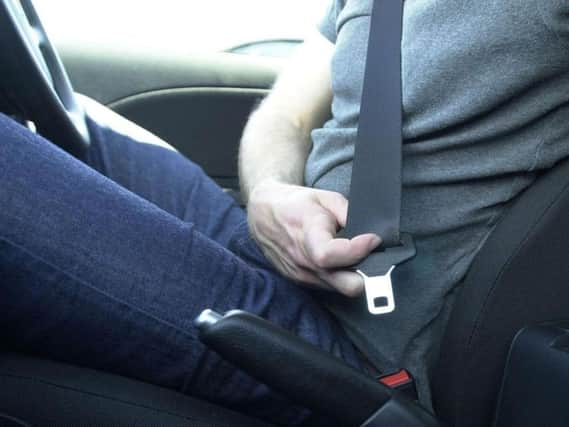Public back penalty points punishment for drivers who fail to wear seat belts


More than seven out of 10 people support the punishment, a survey suggests, even though a change in the law could lead to motorists losing their licence for the offence.
Some 27 per cent of the 787 car occupants who died in crashes on Britain’s roads in 2017 were not wearing a seat belt, latest figures from the Department for Transport show, up from 20 per cent the previous year.
Advertisement
Hide AdAdvertisement
Hide AdRoad safety experts now want stiffer penalties to deter people from not belting up, sentiments which were backed by a survey of 2,004 UK adults commissioned by insurer Direct Line.
The poll indicated that 72 per cent would back the introduction of penalty points for offenders.
Three points on a licence would be an appropriate punishment, 58 per cent of respondents said, while another 30 per cent felt that measure was too lenient and that drivers not wearing a seat belt should clock up six points - the same punishment for using a mobile behind the wheel.
Just one in seven think the current system should continue, whereby offenders are hit with a £100 fixed penalty, rising to a fine of up to £500 if a case goes to court.
Advertisement
Hide AdAdvertisement
Hide AdIntroducing three points for not wearing a seat belt - which is already the case in Northern Ireland - could see some offenders lose their licence, because motorists can be disqualified from driving if they accrue 12 or more points within three years.
Prince Philip was spoken to by police in January after being photographed driving without a seat belt, less than 48 hours after he was involved in a crash.
Young people, however, are nearly three times more likely to be in a car with someone not wearing a seat belt compared to all drivers, research by Brake found. A survey commissioned by the Huddersfield-based road safety charity earlier this year indicated that 49 per cent of drivers aged 18 to 24 had been in a car with someone not wearing a seat belt in the previous 12 months.
Direct Line and the Parliamentary Advisory Council for Transport Safety (Pacts) are adamant that a punishment of three penalty points should be introduced in Britain. They also want greater enforcement of the seat belt law through intelligence-led measures and increased public perception of offenders being caught.
Advertisement
Hide AdAdvertisement
Hide AdPacts executive director David Davies said it was “a shock” that so many people were killed while not wearing a seat belt in 2017, and accepted the road safety community had “taken its eye off the ball”.
Making the offence punishable with three penalty points would have “no impact” on most drivers but would “substantially reduce” the number of people killed or seriously injured, Mr Davies said.
Gus Park, managing director of motor insurance at Direct Line, said the introduction of mandatory seat belt wearing in 1983 had been “one of the most effective road safety measures in the history of motoring”, adding: “It may not prevent collisions, but it can and does prevent death and serious injury.”
AA president Edmund King said he was surprised that drivers had not learnt from the high-profile car crash that claimed the lives of Princess Diana, Dodi Fayad and driver Henri Paul, none of whom were wearing seat belts.
“Bigger fines and penalty points for not wearing seat belts should be introduced as soon as possible to persuade drivers of the importance of belting up,” Mr King said.
